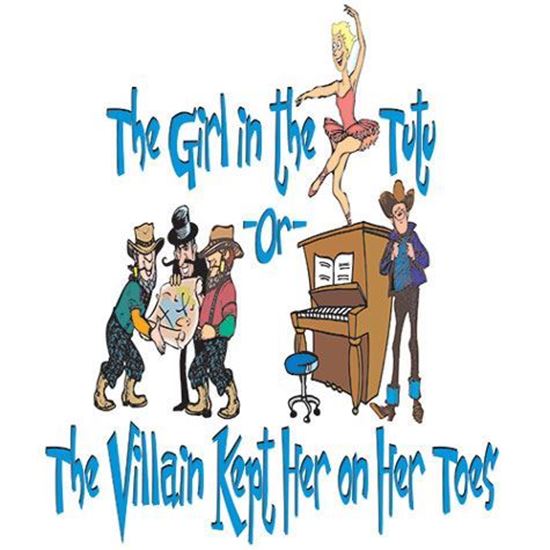


Girl in the Tutu
Here's a fast-moving, fun-filled play that mixes melodramatics with show business. Sonny Nuggett, a young, handsome theatre student (the hero, of course!) tries to assemble a dance act to save his parents' failing restaurant in the Gold Country of Old Californy. Col. Questus Quantrell, a shady showman with hypnotic powers, appears with three clumsy dancing girls. He schemes to take over the café by plotting murder and cheating two old prospectors, Pa and his old partner, Fred, out of their newly re-found "lost" goldmine. Fred is the father of Cora, a beautiful and talented ballet dancer (our lovely heroine!) who gets caught up in the mayhem. The play features a wacky cast, plenty of action, and side-splitting humor.
Productions
Behind The Scenes
PLAYWRIGHTS CARL L. WILLIAMS AND EDDIE COPE
TALK ABOUT "THE GIRL IN THE TUTU"
Q: WHAT INSPIRED YOU TO WRITE THIS MELODRAMA?
Williams: Eddie conceived the basic plot and characters, then asked me to co-write the play with him.
Q: WHAT'S YOUR FAVORITE PART OR LINE IN THE PLAY? WHY?
Williams: My favorite part is whenever the triplets are onstage because they add a lot of fun and energy to the play.
Q: WHEN DID YOU START WRITING?
Cope: 1975.
Williams: I started writing short stories in college, long ago. A few were published. Next, I tried my hand at novels. One of them, "Hanging Justice," is being published soon by John M. Hardy Publishing Company.
Q: HOW DID YOU GET STARTED AS A PLAYWRIGHT?
Cope: I wrote a blackout skit for a revue.
Williams: In 1994, I joined a playwriting group called Scriptwriters/Houston and won their annual ten-minute play contest. Eventually, I advanced to one-act and full-length plays, several of which have won competitions and have been produced.
Q: WHAT DO YOU LIKE MOST ABOUT WRITING PLAYS?
Williams: Since I write comedies, what I like most about writing plays is hearing the laughter of the audience when the plays are performed.
Q: WHAT IS THE MOST CHALLENGING PART OF THE WRITING PROCESS?
Cope: Characterization.
Williams: Besides finding the time to write, the most challenging part is devising a plot that will maintain interest throughout the play, along with characters that engage the audience.
Q: WHAT ARE THE MOST IMPORTANT THINGS TO CONSIDER WHEN WRITING A PLAY?
Cope: Conflict.
Williams: The playwright also has to consider his intended audience and whether his story, characters, and writing are strong enough to please that audience.
Q: WHERE DO YOUR CHARACTERS COME FROM? ARE THEY BASED ON PEOPLE YOU KNOW?
Williams: Most of the characters in my plays are simply invented.
Q: WHAT DO YOU TRY TO ACHIEVE WITH YOUR PLAYS?
Cope: Producability.
Williams: My goal is to entertain the audience, and as many audiences as possible.
Q: WHAT ARE YOUR HOBBIES? WHAT DO YOU DO IN YOUR SPARE TIME?
Cope: Seeing plays, reading plays, and taking cruises.
Williams: Besides running to keep in reasonable shape, I use my spare time to attend plays or readings, and of course to write, or at least to think about writing.
